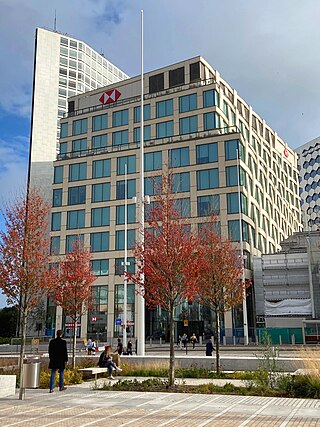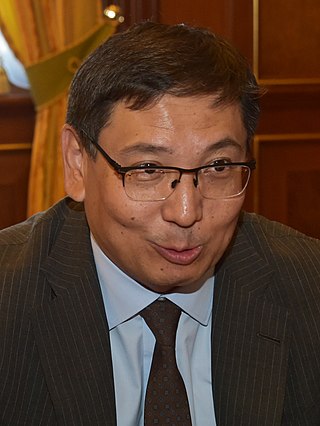
The economy of Kazakhstan is the largest in Central Asia in both absolute and per capita terms. In 2021, Kazakhstan attracted more than US$370 billion of foreign investments since becoming an independent republic after the collapse of the former Soviet Union.

The ING Group is a Dutch multinational banking and financial services corporation headquartered in Amsterdam. Its primary businesses are retail banking, direct banking, commercial banking, investment banking, wholesale banking, private banking, asset management, and insurance services. With total assets of US$967.8 billion, it is one of the biggest banks in the world, and consistently ranks among the top 30 largest banks globally.

Financial services are economic services tied to finance provided by financial institutions. Financial services encompass a broad range of service sector activities, especially as concerns financial management and consumer finance.
HSBC Bank Canada, formerly the Hongkong Bank of Canada (HBC), is a Canadian chartered bank and the Canadian subsidiary of British multinational banking and financial services company HSBC. HSBC Canada is the seventh largest bank in Canada, with offices in every province except Prince Edward Island, and is the largest foreign-owned bank in the country. The corporate headquarters are located at the HSBC Canada Building in the downtown core's financial district of Vancouver, British Columbia. HSBC Bank Canada's Institution Number is 016.
Banking in Australia is dominated by four major banks: Commonwealth Bank, Westpac, Australia & New Zealand Banking Group and National Australia Bank. There are several smaller banks with a presence throughout the country which includes Bendigo and Adelaide Bank, Suncorp Bank, and a large number of other financial institutions, such as credit unions, building societies and mutual banks, which provide limited banking-type services and are described as authorised deposit-taking institutions (ADIs). Many large foreign banks have a presence, but few have a retail banking presence. The central bank is the Reserve Bank of Australia (RBA). The Australian government’s Financial Claims Scheme (FCS) guarantees deposits up to $250,000 per account-holder per ADI in the event of the ADI failing.
Deposit insurance or deposit protection is a measure implemented in many countries to protect bank depositors, in full or in part, from losses caused by a bank's inability to pay its debts when due. Deposit insurance systems are one component of a financial system safety net that promotes financial stability.
HSBC Bank Australia Limited is the Australian subsidiary of HSBC. The bank offers a wide range of financial services in Australia through a network of 36 branches and offices. These services include retail and commercial banking, financial planning, trade finance, treasury, and financial markets, payments and cash management, and securities custody.

HSBC UK Bank plc is a British multinational banking and financial services organisation based in Birmingham, England. It is a wholly owned subsidiary of the global HSBC banking and financial group, which has been headquartered in London since 1993. The UK headquarters of HSBC is located at One Centenary Square in Birmingham.
Kotak Mahindra Bank Limited is an Indian banking and financial services company headquartered in Mumbai. It offers banking products and financial services for corporate and retail customers in the areas of personal finance, investment banking, life insurance, and wealth management. It is India's third largest private sector bank by market capitalisation after HDFC Bank and ICICI Bank. As of 31 March 2023, the bank has a national footprint of 1,780 branches and 2,963 ATMs.

TBC Bank is a Georgian bank headquartered in Tbilisi, Georgia. The name, TBC Bank, traces its root to its original name, Tbilisi Business Centre, dating back to 1992. Currently, TBC is registered as the official name of the bank, not just an abbreviation of the original name.

Retail banking, also known as consumer banking or personal banking, is the provision of services by a bank to the general public, rather than to companies, corporations or other banks, which are often described as wholesale banking. Banking services which are regarded as retail include provision of savings and transactional accounts, mortgages, personal loans, debit cards, and credit cards. Retail banking is also distinguished from investment banking or commercial banking. It may also refer to a division or department of a bank which deals with individual customers.

Erbolat Asqarbekūly Dossaev is a Kazakh politician serving as an äkım of Almaty since 31 January 2022. Prior to that, he was a National Bank of Kazakhstan chairman from 25 February 2019 and served as a Deputy Prime Minister from 29 August 2017 to 25 February 2019. He served as the Minister of Finance from 16 June 2003 to 5 April 2005, headed the Agency for Regulating Natural Monopolies, and later as the Health Minister from 5 April 2004 to 20 September 2006. In January 2013, Dossaev was appointed head of a reorganized Minister of National Economy.
The Kazakhstan Stock Exchange is a stock exchange located in Almaty, Kazakhstan. The exchange was founded in 1993.
Citigroup Pty Ltd was the Australian subsidiary of Citigroup. The bank operated consumer banking services, including credit cards, savings and transaction accounts, loans, insurance, and self-managed superannuation funds (SMSF), as well as private, corporate and investment banking, and wealth management.
Eurasian Bank JSC is the ninth largest lender in Kazakhstan, headquartered in Almaty. It was founded in 1994 as a closed joint-stock company, and reregistered in 2003 as a joint stock company due to joint stock company law changes. The Bank is owned 100% by Eurasian Financial Company JSCwhich is 100% owned by three equal shareholders: Alexander Mashkevich, Alijan Ibragimov, Patokh Shodiyev

United Overseas Bank Limited, often known as UOB, is a Singaporean multinational banking corporation headquartered in Raffles Place, Singapore, with branches mostly found in most Southeast Asia and East Asia countries. It is one of the three "big local banks" in the country, the other two being DBS Bank and OCBC Bank.

RCI Banque SA, trading as Mobilize Financial Services, is a France-based international company that is a wholly owned subsidiary of Renault and part of Renault's Mobilize unit. RCI Banque specialises in automotive financing, insurance, and related activities for the Renault group brands globally for the Nissan group brands in Europe, Russia, Asia and South America; and for Mitsubishi Motors in the Netherlands.
Bandhan Bank Ltd. is a banking and financial services company, headquartered in Kolkata. Bandhan Bank is present in 35 out of 36 states and union territories of India, with 6,140 banking outlets and 3.07 crore customers. Having received the universal banking licence from the Reserve Bank of India, Bandhan Bank started operations on August 23, 2015, with 501 branches, 50 ATMs and 2,022 Banking Units (BUs). The Bank has mobilised deposits of ₹1,08,479 crore and its total advances stand at ₹1,03,168 crore as of June 30, 2023.
There is enormous potential for renewable energy in Kazakhstan, particularly from wind and small hydropower plants. The Republic of Kazakhstan has the potential to generate 10 times as much power as it currently needs from wind energy alone. But renewable energy accounts for just 0.6 percent of all power installations. Of that, 95 percent comes from small hydropower projects. The main barriers to investment in renewable energy are relatively high financing costs and an absence of uniform feed-in tariffs for electricity from renewable sources. The amount and duration of renewable energy feed-in tariffs are separately evaluated for each project, based on feasibility studies and project-specific generation costs. Power from wind, solar, biomass and water up to 35 MW, plus geothermal sources, are eligible for the tariff and transmission companies are required to purchase the energy of renewable energy producers. An amendment that introduces and clarifies technology-specific tariffs is now being prepared. It is expected to be adopted by Parliament by the end of 2014. In addition, the World Bank's Ease of Doing Business indicator shows the country to be relatively investor-friendly, ranking it in 10th position for investor protection.

Freedom Holding Corp. is an investment conglomerate registered in Nevada, USA. The company provides a range of services in retail financial securities brokerage and trading, asset management, capital markets, investment research and counseling, investment banking and underwriting services, mortgages, insurance, and consumer banking. Its main area of focus is in the American stock market, as well as the markets of Central Asia, mainly Kazakhstan.









